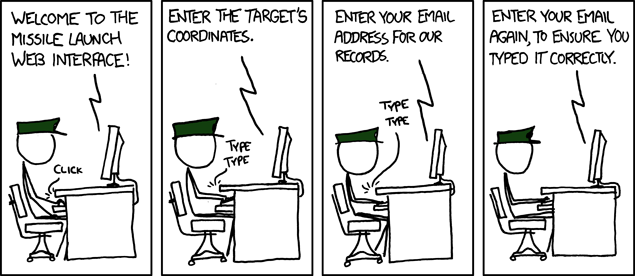#Speculative Bureaucracy
Tega Brain
Summer School, 2016
School for Poetic Computation
August 15th and 16th, 6-9pm
How do governments and institutions describe their goals and administer them? And what if you could rescript these processes? In this class we will develop online interventions to rethink institutional agendas and critique mainstream culture. We will look at the history of culture jamming and apply speculative design strategies, using the contemporary web as medium. Taking delight in the banal, we will experiment with basic web scraping, text manipulation and browser add-ons to provide a glimpse of the world we’d like to see.
##Schedule
Day 1
- Lecture: Histories of bureaucracy and speculation
- Lab 1: Web and JS basics, wget, find and replace
- Group concept exercise
- Homework:
- Make a critical css intervention, editing in the browser or otherwise. Take a screen shot, and bring to class.
- Make a content intervention on a website of your choice, either editing the html, using a tool like clonezone or otherwise. Take a screenshot and come ready to discuss.
- Bring in one critical/creative browser extension you've found in your own personal research.
- Use these experiments to consider a concept for a simple extension.
Day 2
- Homework review and discussion
- Lecture: Creative Strategies. But what does it do?
- Lab 2: Browser add-ons.
- Project exercise/studio
Shared notes from class are here.
##References
- New York Times Special Edition
- Intergovernmental Panel on Capitalism
- Steve Lambert, Add art
- Clone Zone
- Joanne Mcneil, Emotional Labor
- BookIndy, Browse Amazon, Buy Independent addon
- Julian Oliver and Daniil Vasiliev NewsTweak
- Allison Burtch Internet Illuminator
- Dan Phiffer and Mushon Zer-Aviv, Shiftspace
- Amy Balkin Public Smog
- Sara Hendren Accessible Icon
- Addie Wagenknecht GirlsVsGit
- Sam Lavigne Transform any text into a patent application
- Katie Rose Pipkin Rose Colored Window
- Matt Siber, The Untitled Project
- Paolo Pedercini, TweetFired: a reminder
##Readings
###Readings Recommended
- Guy Debord & Gil J. Wolman, A user's guide to Détournement
- Pil and Galia Kollectiv, Some Notes on Art and Bureaucracy
Supplementary
- Ken Goldsmith, 2011, Uncreative Writing, Chapter 2, Language as material.
- Wendy Hui Kyong Chun, 2011, Programmed Visons, Computers that Roar (p55-58).
- Anthoney Dunne, Hertzian Tales, Chapter 5, Real Fiction
- Lisa Gitelman Paper Knowledge, Chapter 4, Near Print and Beyond Paper / Knowing by *.pdf, p111. Discussion of the PDF as format and form.
- Gene Sharp, Politics of non-violent action
- Methods of non-violent action
Tangental but Interesting Talks
- Cory Doctorov keynote from this recent conference
- Natalie Kane Mindful Cyborg Podcast
###Tech Resources
Basics
Javascript
JS Video Resourses
- Foundataions of Javascript tutorials. If you are totally new to JS. This is a great set of videos to start with.
- Or see the Code academy tutorials
Books
- Eloquent Javascript
- You Don't Know JS Series (free ebooks)
- Douglas Crockford, Javascript the Good Parts. This text is for more advanced learners.
Chrome Extensions
- For some more examples see Lauren Mccarthy's repo here.
- To autogenerate a browser extension template see EXTENSIONIZER!!
More on extensions from Google's documentation:
- Getting Started
- Chrome extension overview
- Debugging tutorial
- More extension samples
- Chrome APIs to interact with browser
- Other APIs
- Chrome extension developers’ guide
- Gmail API library
- Publishing your extension
- Chrome extension notes and examples, Dan Shiffman
Thanks Lauren McCarthy, Cory Forsyth, Dan Shiffman, Sam Lavigne and Melanie Hoff for resources/help/prior work in this area.
